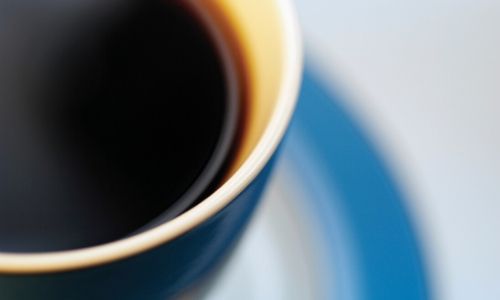Black coffee has been praised for so long as being so much better than milk coffee.
It's the real coffee, the one you drink if you really love coffee.
But is it ? Is black coffee any better than milk coffee ?
And are there any health benefits to drinking black coffee ?
Let's explore this as much as possible, so we can really understand why some folks swear by this drink. And maybe see if it's worth switching to as well.

Table of Contents
Is black coffee good for you ?
So is black coffee good for you ?
Overall yes, black coffee seems to be good for most folks, simply because it's coffee.
Coffee is one of the richest sources of antioxidants that most folks have in their diets. Most folks don't eat enough fruit or veg, but we do drink coffee and/or tea.
Both those drinks are high in antioxidants, so we're at least partly covered.
The problem is, those antioxidants won't work very well if we:
- have unhealthy eating habits
- add carbs and fat directly into the coffee
Do you notice a problem ? If not, don't worry. We'll get to it in a couple of paragraphs.
For now, let's explore the idea of black coffee a bit further, and even compare it to milk coffee.
And just for the record, when I say black coffee I mean brewed coffee that has no added sugar or milk or anything else. Just straight-up pure coffee, fresh and hot.
Is black coffee better than milk coffee ?
By taste, it's a very personal matter.
By health benefits, there's no doubt about it.
When it comes to taste, we each have our preferences. Personally, I went from drinking pure black coffee (espresso) in my teens to the sweetest, milkiest coffee in college.
Currently I take my coffee black in the morning or when I just really need it, and with a half teaspoon of sugar and milk when I just want to relax.
I know folks who can't stand coffee if it's not sweet and milky, and I know folks who think milk coffee is an abomination. To each their own, and in this respect there really is no way of determining if black coffee tastes better than milk coffee.
If we're going to judge by health benefits, then the answer is obviously yes. Black coffee is better than milk coffee, in every way that counts.
Let's explore those health benefits, so we can really understand why black coffee seems to be the best version of coffee there is.
A few benefits of black coffee
There are three main sub-topics here, and the most important I think is the first one.
You'll notice I'm explaining the actual benefits of coffee itself, but honestly the biggest benefit is not adding more sugar and fat to our diet.
The lack of sugar is a health benefit in and of itself
The first and most damage reducing benefits, we don't add any sugar.
No sugar means no added calories, which is always a nice bonus. But what does sugar do, aside from grow our hips and waistlines ?
I think most folks have heard about the dangers of sugar, such as developing type 2 diabetes, high blood sugar, fatigue, and malnutrition to name a few.
So drinking coffee with no added sugar (or any kind of sweetener at all) is going to help us minimize those problems. Or at least postpone them as much as possible.
But we're definitely doing ourselves a favor by not adding more in our coffee.
No milk or cream reduces fat content
The same is true for milk and creamer, to an extent.
You see, milk has a certain fat percentage, as is normal. Creamer is usually more fat-heavy, even if it's in powder form. Check the back of the pack on the ingredients, see for yourself.
Adding a certain type of healthy fats to our diet isn't bad. Omega 3 fat sources such as fish oil, avocado, olives, chia seeds, nuts and seeds are all great.
But milk fat (such as butter) isn't going to help. Which is why we're again doing ourselves a favor by not adding milk or creamer.
Of course, adding 1 oz/33 ml of milk to our coffee isn't going to do us much harm by itself.
But if we do it every day, years on end, and drink 2-4 cups of coffee a day (you know we do), and add some sugar in the coffee... well, we don't get the best results.
If you were to pick the lesser evil, I'd recommend you skip the sugar and just add a dash of milk if you really need something to cut through the bitterness.
The fat in milk is the problem, but it's a bigger problem when we mix it with sugar since our bodies will process them much slower.
Caffeine works better when coffee is plain
All of the above combines into one main point.
Caffeine and its fellow nutrients and antioxidants work way better when the coffee is plain, black coffee.
This is because the sugar and fat add carbohydrates and fats that will essentially:
- slow down caffeine's effects
- kind of neutralize the effects of any antioxidants
Why ? because antioxidants are meant to battle the effects of an overworked and malnourished body.
Exactly what are antioxidants ?
In a very short and abridged explanation, antioxidants are a form of nutrients -mainly vitamins and minerals - that help the body maintain its optimum health.
To understand this, we need to know what antioxidants battle against. Those are called free radicals, and they're not very explicitly named when you first think about it.
They make a lot more sense when you understand them.
Here's a direct quote from Livescience.com on what free radicals actually are:
"The body is under constant attack from oxidative stress. Oxygen in the body splits into single atoms with unpaired electrons.
Electrons like to be in pairs, so these atoms, called free radicals, scavenge the body to seek out other electrons so they can become a pair.
This causes damage to cells, proteins and DNA. " - livescience.com
So what does this mean for you and your black coffee ?
This means the antioxidants in black coffee will have a lot of work on their hands.
Free radicals are produced in greater numbers when we sustain an unhealthy lifestyle. High carb and fat intake leads to malnutrition, which leads to a higher number of free radicals being produced.
By adding sugar and milk (carbs and fat) to your antioxidant-laden drink you'll neutralize their effects.
Any good the antioxidants could've done will be negated by the free radicals the sugar and milk will help produce.
In short, if we want literally any of the health benefits associated with coffee, we need to skip the sugar and milk. It's not easy, but it's been done and people have survived switching to black coffee.
Is it easy to switch to black coffee ?
This depends a whole lot on each individual.
We're all different and for some, the taste of pure coffee might be too much.
I've made this guide to switching to black coffee in a 6 days, and it'll help you get a clear idea of what's ahead of you if you want to make the switch.
Do you have to ditch sugar and milk and only drink black coffee ?
No, it's not a life threatening situation. Despite the talk about antioxidants and free radicals, if your lifestyle is balanced and you eat well your body will take care of itself.
But if you're in a really bad place health-wise, then it sure helps. Not only because of antioxidants, but because it teaches you to go easy with the other sugary drinks or foods.
You'll begin to notice your tea might be too sweet as well, and regular milk chocolate is overly flavored. It's small changes that we stick to over time that really make a difference.
Is black coffee bad for you ?
There are some side effects of caffeine, and yes there are some folks who should keep their intake at a minimum. Or none at all.
Mind the caffeine
Drinking too much coffee can happen to anyone, especially if we work long hours. We don't really think about how many times we top off our coffee from the office kitchen.
Or how strong the coffee we order is, and how many of them we drink in a single evening.
Aside from caffeine being present in drinks like tea and energy drinks.
Anyone, whether healthy or not, should try their best to keep their daily caffeine intake under 400 mg. If you're not sure what that is, know that a standard espresso shot is somewhere around 60-70 mg.
A double shot will be double the amount, so be careful how you order your drink.
Pregnancy, elders, and young children
There are folks who should keep away from caffeine or at the very least limit their intake.
Young children (under 12) shouldn't be given caffeine, simply because their tolerance is very low and they really don't need it.
The very elderly should be limiting their caffeine intake by at least half, unless they've got a medical condition that forbids them from drinking coffee at all.
And finally, pregnant women are recommended to keep away from coffee as well. Most doctors agree that no caffeine is the best way to go. But if you really need a cup of coffee, try and keep the caffeine under 200 mg per day.
Again, no caffeine is the best route here.
If you've got a heart condition
Adults with a heart condition should keep away from caffeine as well.
Caffeine stimulates the heart and nervous system, and gets the blood pumping. It may be too much if your health problems include vascular disease, heart disease, or react very poorly to stress.
Conclusion
In short, black coffee seems to be good for most folks.
It has its downsides, like being amazingly bitter and just too much sometimes.
The caffeine in black coffee also works faster, so that might lead to jitters and cold sweats for those who are a a bit sensitive or made too big a cup.
But for the most part, black coffee seems to be better for our bodies than milk coffee. Definitely better than adding sugar and fats to a diet we're already trying to keep healthy, right ?
If you want to know more about coffee or tea, feel free to check the related articles below. Who knows what else you might find ?










